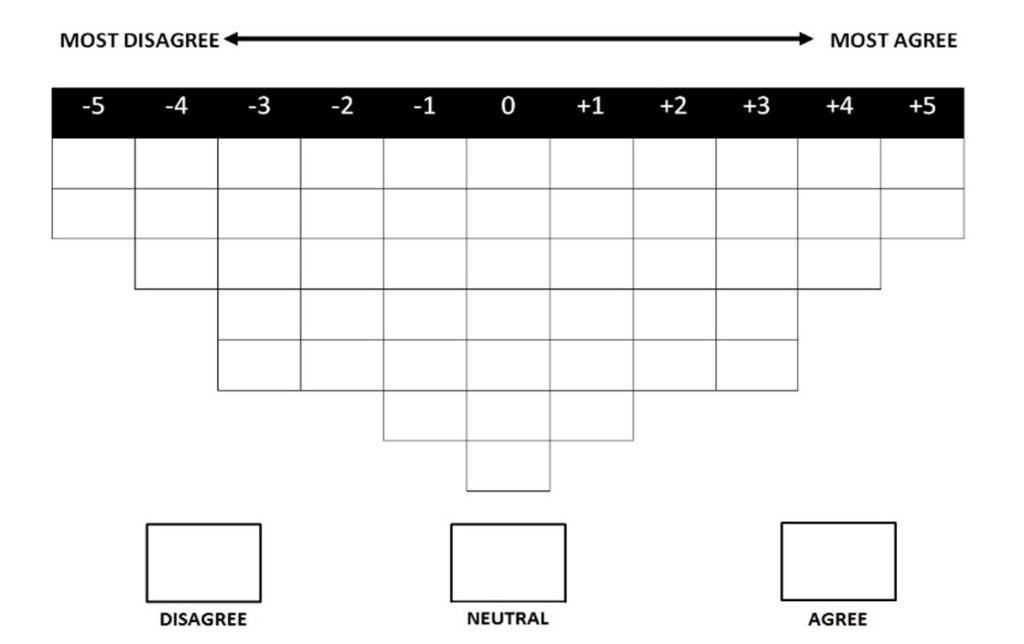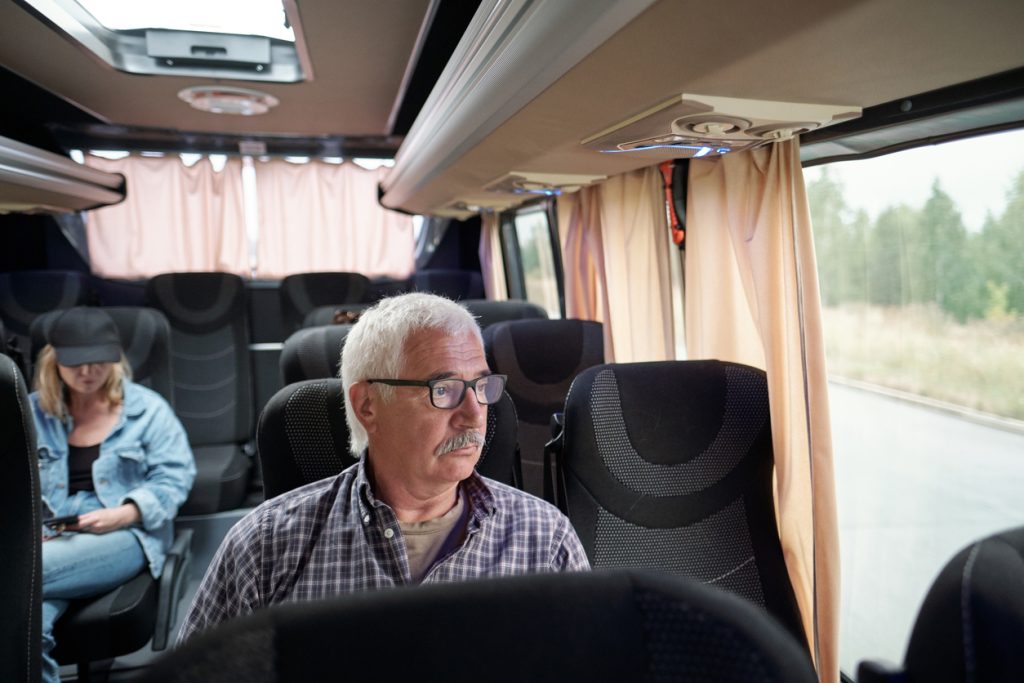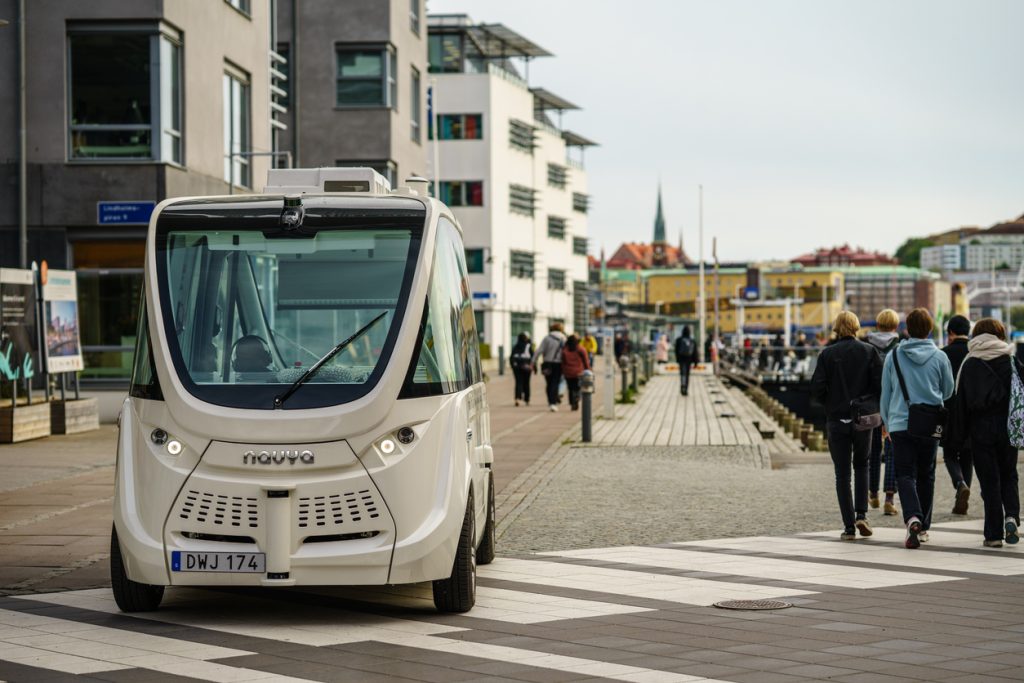Dr Jason Bush, Lecturer in Psychology, Aberystwyth University
(email: jeb64@aber.ac.uk)
What is Q methodology
Q methodology, developed by William Stephenson, allows for the study of subjective opinions (Stephenson, 1935; Stephenson, 1953). It does this by identifying shared views that exist on a topic as well as showing areas of consensus and disagreement between these views. It does this through a process known as Q sorting, where participants rank a set of statements onto a grid by order of preference (see Fig 1). The sorts are then analysed using a by-person factor analysis to identify clusters of shared viewpoints that can then be qualitatively interpreted.

Figure 1 – example Q sort grid
What Q methodology allows researchers to do?
- Q methodology is suitable for topics where respondents do not have a readily constructed narrative (Baker et al., 2006).
- It does not rely on respondents’ ability to ‘articulate consistent or coherent rationale’ instead the accounts are shown through factors which emerge naturally (Baker et al., 2006, p. 18; Brown, 1980; Peritore, 1989).
- Q sorting allows participants to take a more active role and gives them the freedom to explore an issue from their own viewpoint (Donner, 2001).
- Q methodology increases the chances of representing the participants’ actual thinking and allows majority and minority views for participant attitudes to emerge from the data set (Lundberg et al., 2020; Pike et al., 2015).
- Q allows for unexpected accounts to be produced, as it is the respondent that controls the classification process (Baker et al., 2006).
The use of Q methodology in Transport research
Q methodology has previously been used within transport research in a variety of areas such as the accessibility of automated vehicles, views around environmentally friendly transport, intercity bus passenger satisfaction.
Q methodology can be used to examine which factors might be important in transport use. Steg et al. (2001) used Q methodology as part of a study identifying that both instrumental-reasoned (safety, ownership) and symbolic-affective functions (thrill, prestige, value, freedom, opportunity) of the motor car are significant motivations for the attractiveness of car use. Q methodology was used to identify key themes in inter-city bus travel. Two distinct themes emerged, one around travel safety, travel time and terminal accessibility and one on travel comfort, again highlighting the importance of instrumental and more affective factors in mobility (Gangi et al., 2021).

Q methodology can be useful for sorting attitudes and values around planning for the future. Gonzalez-Gonzalez (2022) used Q methodology (with back casting technique) to look at visions for a future driverless city and found three visions: a focus on high-quality urban spaces and active mobility; a more futuristic and pro-social vision and; a more conventional and closer to business-as-usual vision. A study by Zhou (2020) used Q methodology to look at the social effects of AVs, finding three frames on the potential effects: (1) the improved comfort and convenience of Autonomous Vehicles (AVs) will make people live further away from the urban centre, (2) in the short term, AVs will increase social differences but over time AVs will become accessible by all, and (3) improvements in transport and environmental impacts from AVs will enhance the economic dynamism of cities.

Q methodology can also be used to sort people into categories based on their responses. Raje (2007) used Q methodology to develop profiles of people based on discourses around transport in understandings of transport and social inclusion. Cools et al. (2009) found four discourses underpin environmentally sustainable transport: travellers who use public transport as a dominant; alternative, car-dependent travellers, travellers with a positive perception of using public; transport, and travellers with a preference for car use. Krabbenborg et al (2020) used Q methodology to find people’s views on road pricing by asking respondents to rank order subjective arguments that are subtracted from the public debate on the topic, and identified four themes they named, the polluter should pay, Focus on fair alternatives, What’s in it for me?, and Don’t interfere. It can be seen from this type of analysis just how the findings can be used to help policy makers frame an intervention. Based on AVs, Lee and Ahn (2020) found 4 types of AV users: Active supporters, with high confidence on AVs and would be very willing to purchase AVs; Technical acceptance type, some anxiety, but generally satisfied the technology will come good; Dissatisfied with technology all together and unwilling to purchase AVs; and finally, Technology acceptance Anxiety type, a group especially worried about the AV technology failing while driving.
Research with a basis in understanding how people perceive and value transport has real potential to impact on transport policy and practice. Transport is often a place of competing needs between different users. Understanding the different viewpoints, perceptions and values that underpin the needs can be really useful for developing interventions to change behaviours. Q methodology is a way of sorting people’s perceptions and attitudes, identifying key barriers and enablers, helping policymakers to enact successful modal shift policies that could encourage people to change to more sustainable modes of transport.
Further reading on Q methodology
Brown, S. R. (1980). Political Subjectivity: Applications of Q Methodology in Political Science. Yale University Press.
McKeown, B., & Thomas, D. (1988). Q methodology. Sage.
Watts, S., & Stenner, P. (2005). Doing Q methodology: theory, method, and interpretation. Qualitative Research in Psychology, 2(1), 67-91.
Watts, S., & Stenner, P. (2012). Doing Q Methodological Research: Theory, Method & Interpretation. Sage.
References
Baker, R., Thompson, C., & Mannion, R. (2006). Q methodology in health economics. Journal of Health Services Research & Policy, 11(1), 38-45.
Brown, S. R. (1980). Political Subjectivity: Applications of Q Methodology in Political Science. Yale University Press.
Donner, J. (2001). Using Q-sorts in participatory processes: an introduction to the methodology. In R. Krueger, M. Casey, J. Donner, S. Kirsch, & J. Maack (Eds.), Social analysis. Selected tools and techniques (Vol. 36, pp. 24-49). World Bank.
Ganji, S.S. Ahangar, A.N., Awasthi, A. & Bandari, S.J. 2021, Psychological analysis of intercity bus passenger satisfaction using Q methodology, Transportation Research Part A: Policy and Practice, 154, 345-363, ISSN 0965-8564,
González-González, E., Cordera, R., Stead, D. & Nogués, S. (2023) Envisioning the driverless city using backcasting and Q-methodology, Cities, Volume 133, 104159 ISSN 0264-2751, https://doi.org/10.1016/j.cities.2022.104159.
Krabbenborg L., Molin E., Annema J.A. & van Wee B. (2020). Public frames in the road pricing debate: A Q-methodology study. Transport Policy. ;93:46–53. doi: 10.1016/j.tranpol.2020.04.012
Lee, Y.-J. & Ahn, H. (2020)A study on the Users’ perception of autonomous vehicles using Q methodology. The Journal of the Korea Contents Association, 20 (5) , pp. 153-170, 10.5392/JKCA.2020.20.05.153
Lundberg, A., de Leeuw, R., & Aliani, R. (2020). Using Q methodology: Sorting out subjectivity in educational research. Educational Research Review, 31, 100361.
Peritore, N. P. (1989). Brazilian Party Left Opinion: A Q-Methodology Profile. Political Psychology, 10(4), 675-702.
Pike, K., Wright, P., Wink, B., & Fletcher, S. (2015). The assessment of cultural ecosystem services in the marine environment using Q methodology. Journal of Coastal Conservation, 19(5), 667-675.
Rajé F. (2007), Using Q methodology to develop more perceptive insights on transport and social inclusion, Transport Policy, 14,6, 467-477, ISSN 0967-070X, https://doi.org/10.1016/j.tranpol.2007.04.006.
Steg, L. Vlek, C. & Slotegraaf G. (2001) Instrumental-reasoned and symbolic-affective motives for using a motor car, Transp. Res. Part F: Traffic Psychol. Behav., 4 (3) (2001), pp. 151-169, 10.1016/S1369-8478(01)00020-1
Stephenson, W. (1935). Technique of Factor Analysis. Nature, 136(3434), 297-297.
Stephenson, W. (1953). The study of behavior; Q-technique and its methodology. University of Chicago Press.
Zhou Q. (2020) Analysis of social effects of autonomous vehicles, Academic Journal of Engineering and Technology Science, 3 (1) , pp. 65-74, 10.25236/AJETS.2020.030109